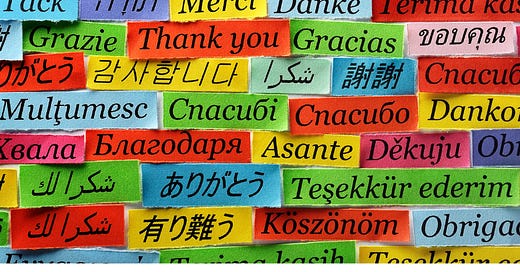A Thin Black Line
I’ve spent the past week nursing a terrible cold that my adorable daughter deemed share-worthy. I was completely healthy and then *wham*, what felt like out of nowhere, I was a stuffy nose, watery eyes, sneezing mess of a human. I woke up one morning last week feeling fine and by lunchtime I wanted to hide in bed. Of course, it wasn’t completely out of the blue but the shift between feeling well and feeling ill was nearly imperceptible to me.
Yesterday, I was talking with a colleague who remarked that the negative space on the screen between our Zoom videos reminded him of a Jewish text he had seen years ago that was discussing life and death1. The page had a thin black line drawn down the center and on one side was the text about life and on the other side, about death. The line was to illustrate how fragile the space is between the two.
Some of the happiest people I know are people who talk often about mortality so it’s no surprise that the black line on Zoom could serve as a reminder to have gratitude for life.
Gratitude practices have become a core pillar of all things wellness. There are studies on the benefits of practicing gratitude and we also know how rooted in Jewish tradition it is.
In fact, there’s a daily practice in Judaism that, quite clearly, combines an awareness of mortality with gratitude. Modeh2 Ani, I give thanks, is the very first prayer of the day. Many people say it before they even get out of bed. The prayer literally says: “I thank you, living and enduring king, for you have graciously returned my soul within me.”.
Growing up, I didn’t realize that I was acknowledging the “return of my soul” every morning and that for a few hours every night I might be existing in a liminal space between life and death. I probably would not have understood that as a child but I understand it better now.
I think it’s a gift to be aware of that thin black line, the fragile space that exists between life and death and I believe we have a choice in how to respond to the moments that we remember our mortality. To approach that awareness with awe and gratitude is freeing.
I hope wherever you find the spaces that exist between two possibilities (terrible head colds excluded), they gift you moments of reflection for the good things in life.
Shabbat Shalom!
ON THE POD
Nothing new this week because I decided I didn’t need to record while sounding like The Swedish Chef. Stay tuned for a new episode next week!
In the meantime please show your support by leaving a rating and a comment wherever you listen to your podcasts. It helps ensure these incredible stories and interviews are seen by many others. Thank you!
Now that I’m thinking about it, I’m wondering if that was a commentary on how sick I looked with this cold…😂
Side fact: Modeh and Vidui (the confession prayer often said at the deathbed) share a root. We also say Vidui on Yom Kippur, the Day of Atonement.




